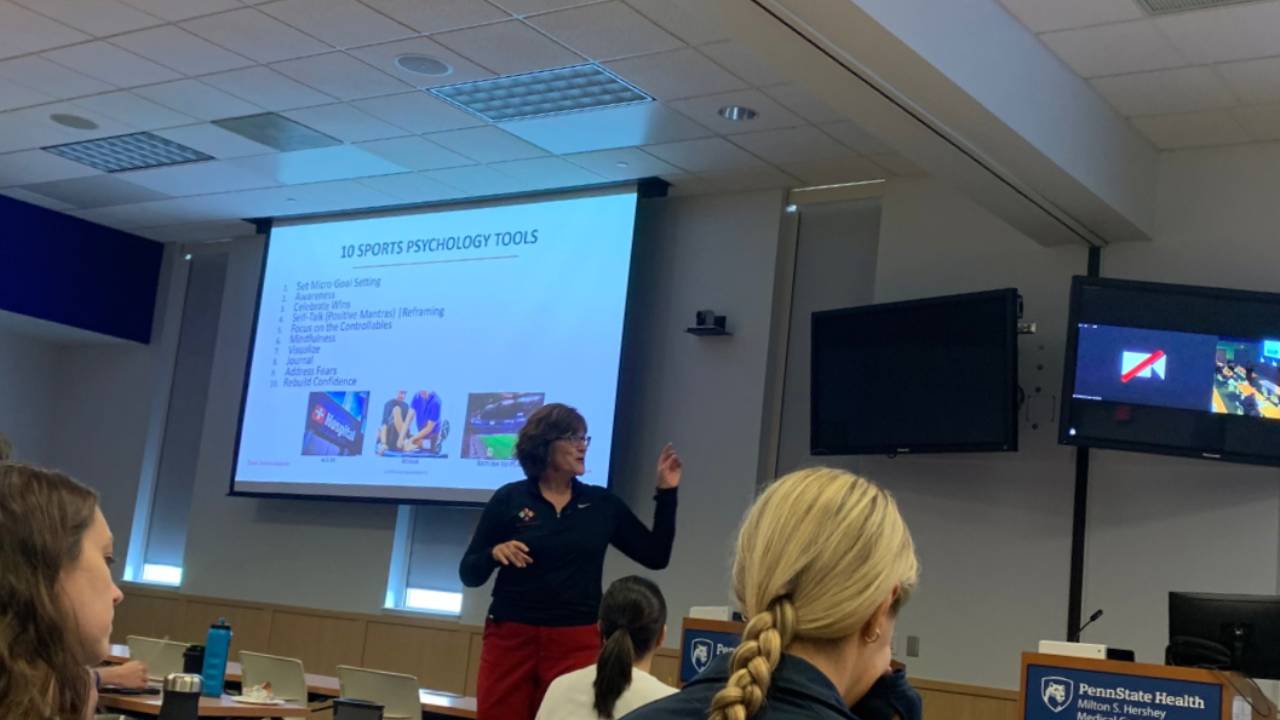From Setback to Comeback: Sports Psychology Strategies to aide in Athlete Recovery

Injured Athlete Recovery is both a Mental and Physical Journey
On June 13, 2023, I had the privilege of delivering a powerful presentation at the 11th Annual Central PA Sports Medicine Symposium.
My talk, "From Setback to Comeback," focused on an often-overlooked aspect of athlete recovery: the crucial role of sports psychology. I shared 10 valuable tips specifically tailored for healthcare providers to support injured athletes during their journey towards full rehabilitation.
Injuries and illnesses are not just physical challenges; they encompass the entire body and mind. While the recovery process predominantly emphasizes the physical aspects, we cannot underestimate the profound impact of mindset on the healing process.
Having worked closely with numerous injured athletes, many of whom were already familiar with my coaching techniques during their healthy days, I have witnessed the positive transformation that occurs when they embrace a positive and resilient mindset. Trust and familiarity play key roles in this process, as they have experienced the effectiveness of our approach firsthand.
What sets our process apart is its undeniable track record of success. Not only have I witnessed athletes release their fears and make triumphant returns to competition, but I have personally walked the path of recovery myself. In June 2021, I overcame a significant injury, and in June 2022, I successfully navigated a challenging surgery, utilizing the very tools and strategies I share with others.
Types of Injuries
Injuries of any nature can create an emotional and physical set back.
An athlete can incur:
A nuisance injury - one that bothers them all season long and interferes with their performance.
Season interruption injuries - one's that take them out of their sport for a few days to a few weeks.
Season ending - 1st time (= Devastation)
Season ending - Repeat (= Super devastation)
Career ending (Soul crushing at the time.)
Stages of Grief
Injured athletes suffer "a loss."
A loss of their identity, their community, and their natural mood enhancers.
Loss of Identity
The injured athlete is still an athlete.
Their recovery is now their focus.
They must lean into their recovery just like they lean into their pursuit of sport's goals.
Loss of Community
How can you help an athlete stay connected to their community?
An athlete I worked with was so fortunate. Her coach had her standby h side during games to learn the game through his eyes. He had her talk to the girls at half time.
Today, she will tell you she is a better athlete because of that experience.
Loss of Mood Enhancing Chemicals
When we work out, we produce serotonin, endorphins and more which are natural mood enhancers.
Help an injured athlete identify WHAT THEY CAN do within guidelines of their rehabilitation.
Stages of Grief through loss
Emotionally athletes will journey through the stages of grief.
Shock/Denial
Anger
Sadness/Depression
Bargaining
Acceptance.
The emotional journey is not a straight line and can vary depending on the timeline for recovery.
10 Sport Psychology Tips for Athletic Trainers, Physical Therapist and Strength & Conditioning Coaches
It takes a village.
It takes a community of support to help an athlete successfully navigate the mental and physical challenges of their recover.
Many professional athletes who are surrounded with the best resources in their sport, report that injury recovery can be a dark time for an athlete.
1. Set Micro Goals with the athlete.
2. Ask the athlete, "When are you happiest? What helps you be your best? What do you enjoy?"
3. Celebrate wins with your athlete! Acknowledge consistency in keeping appointments. Acknowledge effort and progress towards goals.
4. Introduce and encourage breath work and mindfulness to help the athlete center and calm during and in advance of challenging times.
5. Help your athlete focus on what they CAN control; help them identify what they can control vs. what they cannot control.
6. Visualize returning to competition healthy and strong. Mentally replay great moments in your sport. Mentally practice your sport.
7. Listen your athlete's self-talk. Is it negative? Does it need some reframing? I can't do x YET. Help them establish positive mantras: I am healing. I am patient.
8. Introduce the power of journaling. (Join our BETA TEST group for our journal that is under development.)
9. Discuss their fears.
10. When released to return to play, help them build their confidence. Ask what they need as evidence to help them BELIEVE they are ready to play.
Stamina for the injured Athlete Recovery Journey
Depending on the length of the recovery process, the emotional ride can be a roller coaster. Have patience and continue to check in on the emotional well-being of your athlete.
Stay in touch
We are working on a Journal for Injured Athletes - if you are an athlete and have a story of comeback or pivot that you would like to share - with an emphasis on helping other athletes navigate the recovery process, we would love to hear from you. Share your story.
We are writing an Journal for injured athletes and would love folks to join our BETA group to give us feedback at key milestones in the process. Join our BETA Group.
LOOKING FOR MORE?
Start receiving my latest mental game tips, news and updates on how you can start taking action in your business, coaching career and sports performance.
This is a spam free zone.

